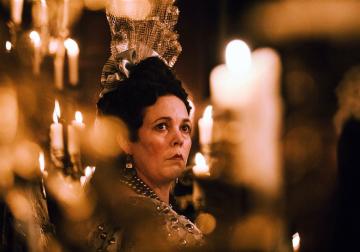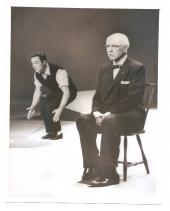Which of Queen Anne's two powerful ladies will be 'The Favourite'?
If you knew Queen Anne only for her eponymous furniture and architecture, rest easy: You’ll know more than you ever wanted to know after viewing “The Favourite,” a spectacular and brilliantly acted biopic — with liberties, if not justice, for all.
Anne was the last of the Stuarts but the first monarch of a new country called “Great Britain,” after the Act of Union joined England, Scotland, Ireland and Wales. Her dozen-year reign (1702-1714) coincided precisely with the long, unpopular War of the Spanish Succession that tangled her up in the same Catholic-Protestant strife that had cost her grandfather Charles I his head.
At film’s outset, we find a very unhealthy Queen Anne (Olivia Colman) presiding in name only over a court full of scheming men in wigs, with beauty marks, indulging in decadent duck races (the races, not the ducks, are decadent), while important royal business is controlled by her close friend and “favourite” Lady Sarah (Rachel Weisz), Duchess of Marlborough, whose heroic husband has just won a great victory at the 1704 Battle of Blenheim.
Sarah (her titles include Mistress of the Robes, Groom of the Stool and Keeper of the Privy Purse) is an empowered bully, who manages the Queen’s ill health and mercurial temper while incessantly pushing her to favor pro-war Whigs over peace-seeking Tories. The politics of war are consuming her when her cousin Abigail (Emma Stone) arrives and ingratiates herself. Sarah promotes the girl to “woman of the bedchamber” — lady-in-waiting — to step in as the Queen’s companion.
- Starring: Olivia Colman, Emma Stone, Rachel Weisz.
- Rating: R for strong sexual content, nudity and language.
Abigail’s favourite status with Anne waxes as Sarah’s wanes. Abby takes over as Keeper of the Privy Purse. (No mention of the Groom of the Royal Stole.) Both women, in any case, are equally adept maneuverers/intermediaries for the shifting factions, especially that of smarmy Robert Harley, Speaker of the House of Commons (Nicholas Hoult).
All that intrigue is intriguing, but not so titillating as the alleged dueling lesbianism between Anne and the two favourites. Historical fact: Sarah would berate the Queen for her “strange and unaccountable” passion for Abigail, and Anne would write the Duke of Marlborough asking that his wife “leave off teasing and tormenting me and behave herself.” Abigail seemed to truly love her husband Samuel (Joe Alwyn) — as suggested by their fabulous outdoor wrestling match in one of the film’s best sequences.
That, and all the other scenes, are beautifully photographed, full of fish-eye lensing and unorthodox angles with lots of West Wing-type dialogue-on-the-move dialogue (some of it jarringly obscene). The eerie soundtrack consists of more low buzzing, strangely percussive sounds than music, with a tense one-note continuo.
Greek-born director Yorgos Lanthimos’ remarkable previous entries include “The Lobster” (2015), in which all single people in the dystopian future must either find a partner or be transformed into animals, and “The Killing of a Sacred Deer” (2017) an unsettling, Kubrickian psychological thriller. His dark visions typically contain enough levity to qualify, arguably, as black comedies.
“The Favourite” has its wickedly funny moments, too: the Queen’s periodic hysterical outbursts, her formal public outfits that look like S&M bondage-and-discipline gear, her chocolate pudding bath, and the outlandishly sexual choreography at a court ball. Gratuitously over-the-top: a weird debauch where people throw rotten tomatoes at a naked fat guy and Abigail’s soliloquy while pleasuring her hubby on their wedding night!
But you gotta love all the Queen’s rabbits — surrogates for her 17 lost children. And you especially gotta love the three stellar performances: Ms. Colman’s painfully real Queen, with her huge range of moods and voices; Ms. Weisz’s indomitable Sarah — direct ancestor of both the Churchills (as in Winston) and the Spencers (as in Princess Diana); and Ms. Stone’s deceptively charming Abigail.
Ambiguity abounds in the ending, after which we are forced to endure one of those awful, sappy “exit songs” that ruins the mood. I must also record a first in my 40-some years of film reviewing: The young woman seated next to me was knitting the entire time. Go figure.
Yes, well. We’ll give the bottom line to Ms. Weisz’s characterization of the film in a recent interview: “It’s like a funnier, sex-driven ‘All About Eve.’”
Post-Gazette film critic emeritus Barry Paris: parispg48@aol.com.







